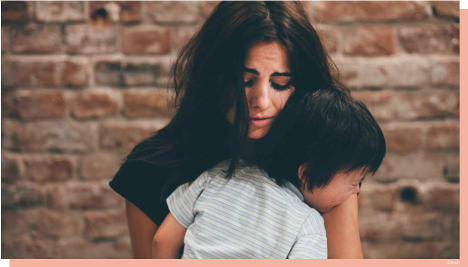I was recently interviewed for an article written by Tonilyn Hornung for Mom.com on the difficulties in mothers have faced during the pandemic. Below is the article and a link to the full article.
“A Year Into COVID-19, and Moms Are Still Feeling the Aftershocks on Their Mental Health”
by Tonilyn Hornung
March 8, 2021

This month marks the one-year anniversary of the COVID-19 virus officially entering our lives. Words and phrases that initially sounded strange like social distancing, remote learning, and Bridgerton now easily roll off the tongue. Besides bringing us a new set of vocabulary words, this pandemic year has also impacted us in ways we couldn’t have predicted. Mothers have felt this shift deeply in their emotional core — and the aftershocks are still resonating.
Supatra Tovar, PsyD, RD Clinical Psychologist and Registered Dietitian, says, “Moms carry an extremely high level of stress because they generally take up the lion’s share of the duties in the home. Then, when you add on the pandemic, it just goes up exponentially.” When pandemic-related stresses such as unavailable childcare, remote learning, and suddenly working from home pile up on the tasks mamas already perform, it makes for one gigantic mountain of increasing tension and worry.
When the pandemic began, Angel Creeks, a married mother of two teenagers, was employed
In March 2020, she was confident she was only being asked to take a two-week hiatus to “flatten the curve.” Those two weeks stretched into two months, and soon her position was made obsolete. Her stresses quickly became overwhelming, “I’m freaking out about finances. And then I’m freaking out about my kids being stuck in the house all the time… and now I’m the teacher,” she says.
Creeks isn’t alone in feeling the weight of the financial and emotional fears the pandemic has wrought. “All parents are feeling the strain,” says Laurel Sims-Stewart, a therapist and community outreach director at Bridge Counseling and Wellness. “We just know that women tend to be disproportionately affected because they tend to fall into the role of the default parent,” she says. This is the parent that’s more in control of the mental labor, which can include scheduling, planning, and basically doing all the things.
Mika Gonda is married with two children, ages 5 and 8
She and her husband were looking for more of a balance while isolating together, so she wouldn’t have to do all the things. They decided to set up a schedule to keep parenting duties more fair. “When remote learning started, I was terrified. My husband would take our oldest, and I took our youngest, and at noon he would go to work and I would take both kids,” Gonda says. It was a big learning curve figuring out how to pivot, and even with support from her husband, she says her life has been nonstop, with no breaks, 24 hours a day, for a year.
Ashley Vangilder, a single mother and unit coordinator for technical services at a large university hospital, says, “This year has definitely gotten a lot more stressful.” When COVID first began, she switched from the day shift to the night shift to limit her exposure and to keep her two-and-a-half-year-old daughter safer. Vangilder was ready to protect her daughter, but making this decision seriously limited time with her toddler. “It was more difficult being on the night shift because I barely got to see her,” she says.
Moms have been making tough calls all year long
For example, some working moms have been forced into choices like stepping out of the workforce in order to become their child’s primary caregiver. And for those working and momming, Dr. Tovar says she witnessed them adjusting their schedules to accommodate homeschooling more than their respective partners. These intense pressures can lead to increases in anxiety and burnout. “This stress reaction is so incredibly intense for moms, especially in this crisis,” Dr. Tovar says.
Creeks shares that six months into the pandemic, her emotional life began to get “a little scary.” She felt fortunate that her husband was able to continue working, but the guilt of her unemployment, paired with her teens not being able to go anywhere, took their toll. “It was getting to be too much for me. I was putting it all on my shoulders,” Creeks says.
A lot of moms find themselves in the same emotional space as Creeks
“Moms, especially, take on the load and don’t say much about it,” Sims-Stewart says. She goes on to say that, as mothers, we can’t continue to pile on tasks and not feel the effects. “Stress and anxiety have increased so significantly this year in part because we’ve hit capacity. It’s brought to light that we need more help and we need more support,” she says.
Vangilder says she wouldn’t be able to survive without the support of her aunts. “I’m very fortunate. I’ve got an amazing village that helps me because it’s just me,” she says. Building that village or asking for help is one way to alleviate some of the major stressors wrapped up in last year. Creeks reached out to her husband and together they carved out time and space for her. She says this definitely had a positive effect on her mental health.
For those feeling emotionally fragile, Dr. Tovar suggests positive activities such as scheduling daily moments for self-care, reaching out to friends, taking time outside, or seeking the services of a mental health professional. Another suggestion is for moms to be truthful with their partners. “I also encourage my clients to be more assertive with their spouses to get more help if they have generally taken on more,” she says.
Gonda says that even through feelings of stress and struggle, she’s found some happier outcomes
She and her husband now move through arguments faster and their communication has deepened. “Talking about this, we can potentially see it as a positive. Moms and women are being more honest about how all of these expectations affect our mental health,” says Sims-Stewart.
See article on Mom.com

Recent Comments